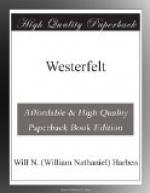He rose, sat on the edge of the bed, and clasped his hands between his knees. The room was in darkness except the spot of light on the wall behind the book. Below he heard the horses crunching their corn and hay. He took from his pocket Sue Dawson’s letters and the one from Sally and wrapped them in a piece of paper. Then he looked about for a place to hide them. In a corner overhead he saw a jutting rafter, and behind it a dark niche where the shingles sloped to the wall. It was too high for him to reach from the floor, so he placed the table beneath the spot, and, mounting it, pushed the packet tightly into the corner. Then he stepped down and removed the table, cautiously, that Washburn might not hear him, and sat on the bed again. He remained there motionless for twenty minutes. Suddenly a rat ran across the floor with a scrap of paper in its mouth. He stared at the place where the rat had disappeared as if bewildered, then rose, placed the table back against the wall, secured the packet, and put it into his pocket.
Chapter XII
Westerfelt knew he could not sleep, and, seeing the moonlight shining through his window, he decided to take a walk. He went below. Washburn sat in a little circle of candle-light mending a piece of harness.
“Has the hack come in yet?” asked Westerfelt, remembering that he had paid little attention to business that day.
“Yes,” answered Washburn; “it’s down at the store unloadin’ the mail.”
“I thought I heard it turn the corner. Any passengers?”
“No; Buck said a family, one woman and five children, wus ready to start by the Cohutta road to Royleston, but the report about the Whitecaps t’other night skeerd ’em out of it, so they went by train to Wilks, an’ through that way. This outlawin’ will ruin the country ef it hain’t stopped; nobody’ll want to settle heer.”
“I’ll be back soon,” said Westerfelt, and he went out.
The November air was dry and keen as he walked briskly towards the mountains. The road ran through groves of stunted persimmon and sassafras bushes, across swift-bounding mountain streams, and under natural arbors of wild grapes and muscadine vines. In a few minutes Westerfelt reached the meeting-house on a little rise near the roadside.
It had never been painted, but age and the weather had given it the usual grayish color. Behind it, enclosed by a rail fence, was the graveyard. The mounds had sunk, the stones leaned earthward, and the decaying trellises had been pulled down by the vines which clambered over them.
It was a strange thing for Westerfelt to do, but, seeing the door open, he went into the church. Two windows on each side let in the moonlight. The benches were unpainted, and many of them had no backs.
Westerfelt stood before the little pulpit for a moment and then turned away. Outside, the road gleamed in the moonlight as it stretched on to the village. A glimpse of the graveyard through the window made him shudder. It reminded him of a grave he had never seen save in his mind. It was past midnight. He would go back to his bed, though he felt no inclination to sleep.




